Key takeaways:
- Caregiver burnout is a gradual process that manifests as physical and emotional exhaustion, highlighting the importance of recognizing its signs early.
- Setting boundaries and cultivating a support network are essential strategies for managing caregiver stress and maintaining well-being.
- Self-care is crucial; caregivers need to prioritize their own needs to provide effective support to others.
- Engaging in reflective practices, such as journaling and mindfulness, can help caregivers process their emotions and prevent burnout.
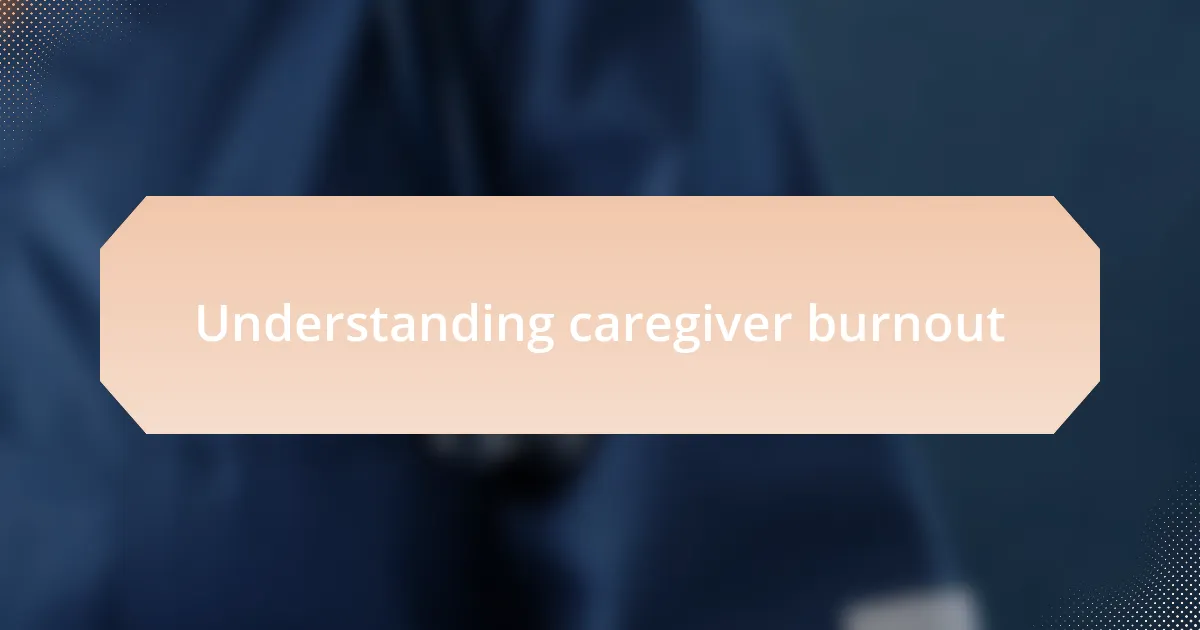
Understanding caregiver burnout
Caregiver burnout is a state of physical, emotional, and mental exhaustion that can strike anyone who cares for someone else, be it a family member or a patient. I remember feeling utterly drained during a particularly challenging time; it was as if my energy was a flickering light bulb, struggling to stay on. Have you ever felt that way? It can be unsettling when the act of caring for others starts to feel burdensome rather than fulfilling.
Often, this burnout creeps in slowly, making it easy to dismiss until it becomes overwhelming. I found myself snapping at loved ones over trivial matters, realizing I was carrying the weight of everyone’s needs on my shoulders. It’s almost like a silent thief that steals joy and patience; has that been your experience, too? Recognizing the symptoms can be crucial to addressing them before they spiral out of control.
Understanding that self-care is not selfish but essential has been a pivotal realization for me. I had to learn to carve out moments for myself, whether it was a quiet cup of coffee or a brisk walk. What do you do to recharge? Just like any other job, caregiving has its demands, and acknowledging our limits is part of honoring the commitment we make to those we care for.
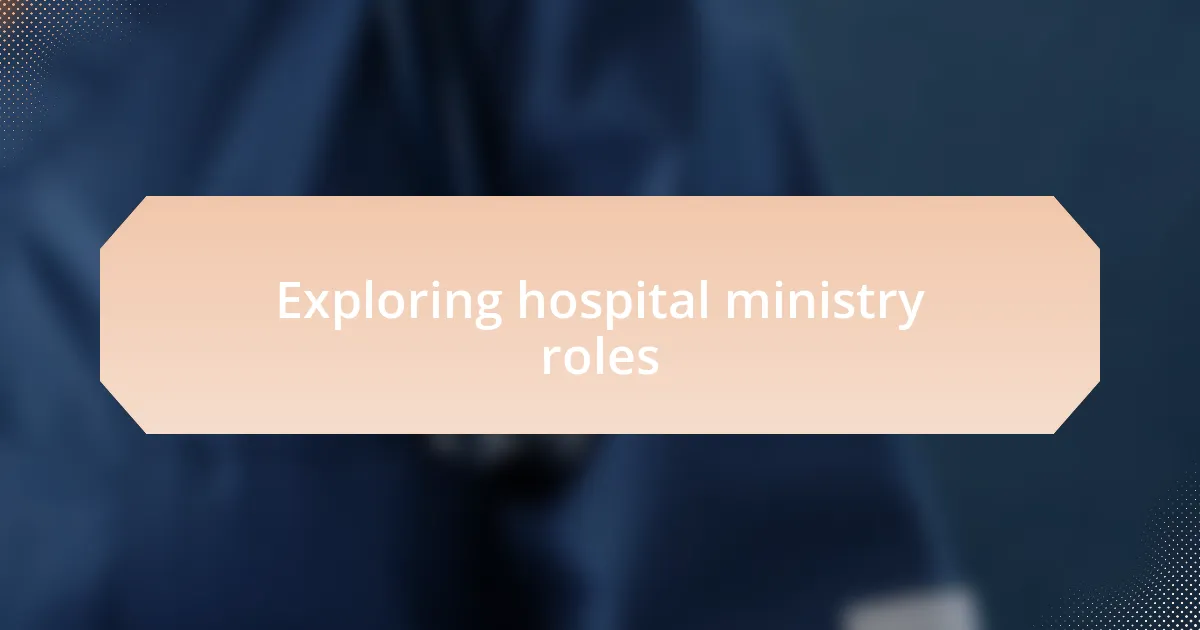
Exploring hospital ministry roles
Exploring hospital ministry roles can reveal a nuanced tapestry of responsibilities that vary significantly among individuals. For me, stepping into a chaplaincy role meant not just providing spiritual support but also acting as a bridge between patients, families, and healthcare staff. I still recall a moment when a simple conversation transformed a patient’s anxiety into relief, reminding me how impactful these roles can truly be.
Hospital ministry isn’t solely about visiting patients; it’s about listening and offering hope, even amid despair. I often engaged in profound discussions with families facing difficult decisions, feeling the weight of their grief and uncertainty. Have you ever found yourself in a moment where your words could ignite a flicker of hope in someone’s heart? It’s moments like these that reaffirm why these roles matter.
These roles also require significant emotional resilience and the ability to manage one’s own feelings while being present for others. In my early experiences, I sometimes struggled to compartmentalize my own stress, especially during long shifts. It got me thinking—how do we ensure our own spirits remain buoyant while supporting others? It’s a delicate dance that demands constant reflection and adjustment.
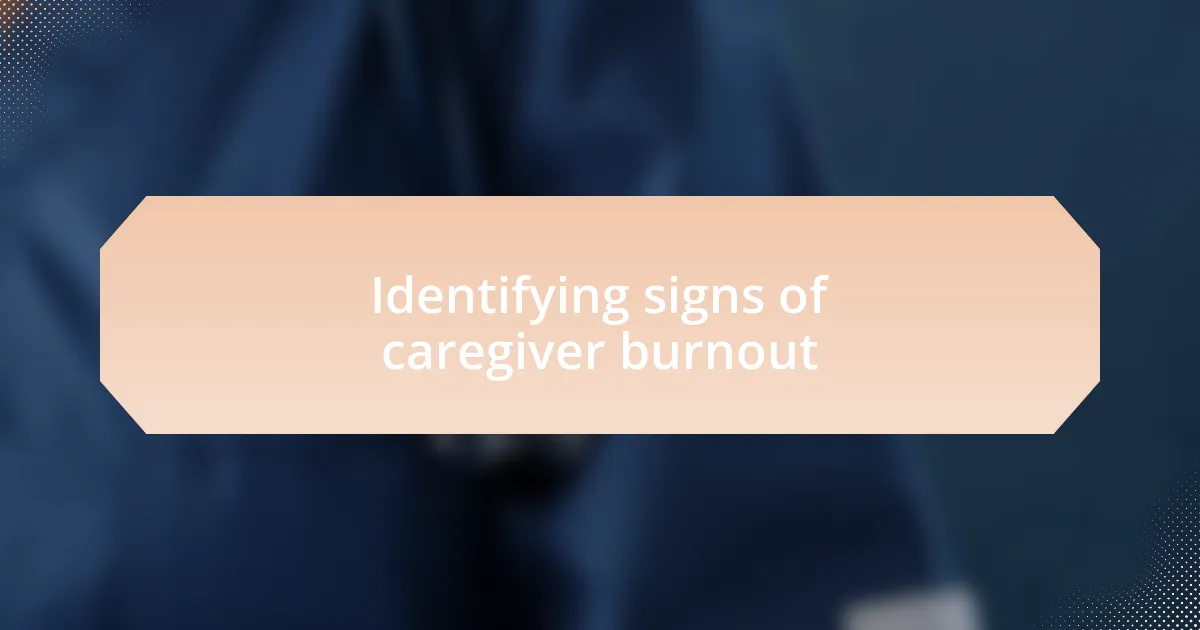
Identifying signs of caregiver burnout
Recognizing the signs of caregiver burnout is crucial for maintaining both your well-being and the support you provide to others. I vividly remember days when I’d feel an overwhelming sense of fatigue, not just physically but emotionally drained as well. Have you ever found yourself feeling irritable over minor issues or withdrawing from loved ones? Those can be telling indicators that you might be nearing burnout.
Another significant sign to watch for is a sense of detachment. I remember a time when I had a hard time feeling empathy during sensitive conversations, which alarmed me. This emotional numbness can creep in quietly, making it difficult to connect with the very people we aim to support. I learned that attending to these feelings early can prevent the deeper pit of burnout.
Lastly, if you find yourself constantly questioning your effectiveness or feeling compelled to be perfect, it’s time to pause and reflect. In my own experience, the pressure to provide unwavering support sometimes left me feeling hopeless. This internal struggle can spiral, leading to a decline in both mental health and caregiving quality. How can we navigate this tricky emotional terrain while still being pillars of support for others? Tackling these signs with honesty is the first step toward recovery and resilience.
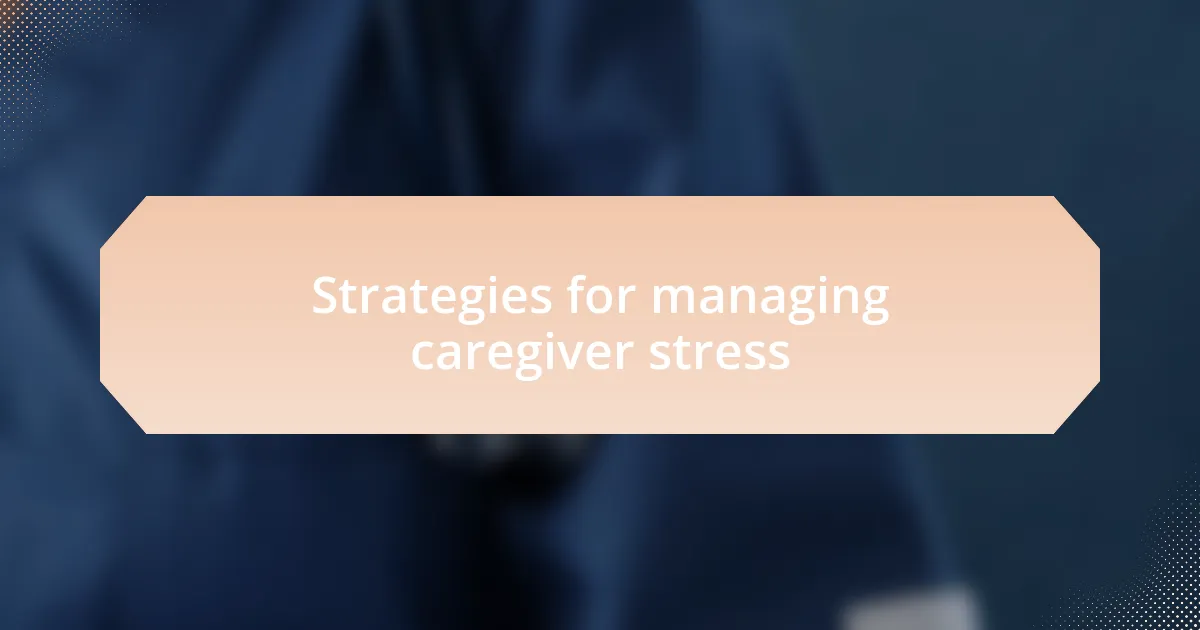
Strategies for managing caregiver stress
Finding ways to manage caregiver stress is essential to maintaining both your health and effectiveness. One strategy that worked for me was setting clear boundaries. I remember the first time I turned down a request for extra help. Initially, I felt guilty, but the relief that followed reminded me that I couldn’t pour from an empty cup. Have you considered what boundaries might look like for you?
Another approach that proved invaluable was cultivating a support network. Sharing my experiences with fellow caregivers often brought unexpected comfort. I recall a particularly tough week when I reached out to a friend who understood the weight of my responsibilities; just talking about it made the burden seem lighter. Wouldn’t it be beneficial to find those who can relate to your journey?
Lastly, I discovered the importance of incorporating mindfulness practices into my daily routine. For instance, spending just a few minutes each day in quiet meditation helped ground me and pushed away the chaos. I found myself asking, how often do we take time to simply breathe? I highly encourage you to explore such practices; they can profoundly change your perspective amidst the caregiving storm.
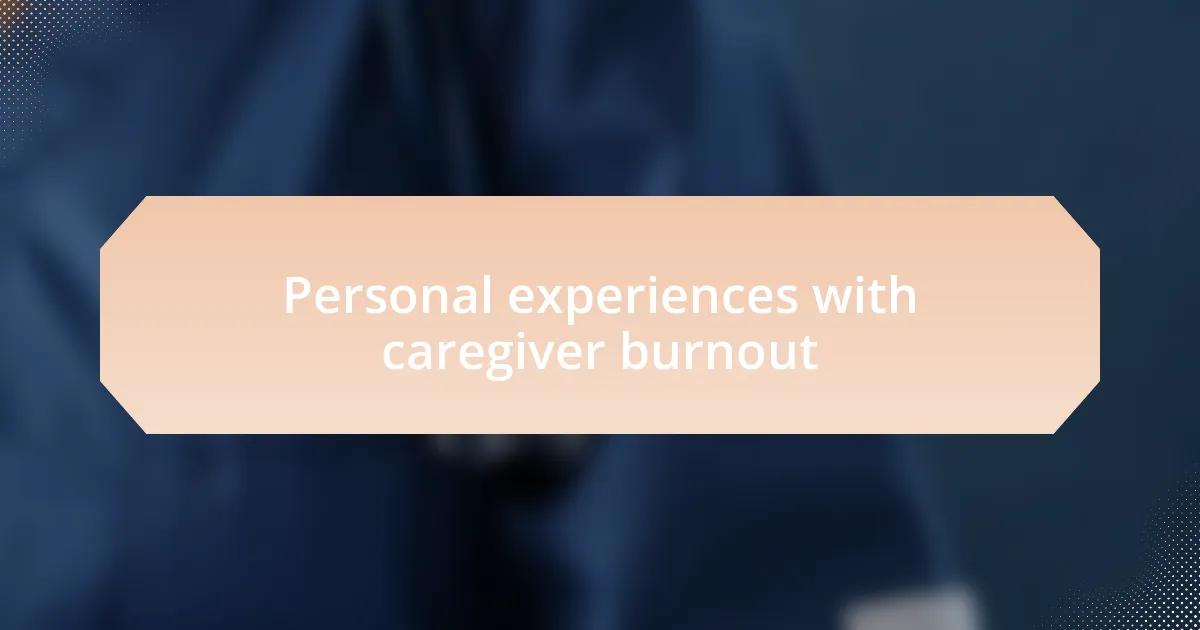
Personal experiences with caregiver burnout
Caregiver burnout crept up on me during a particularly challenging period when I was balancing work with caring for my aging parent. I vividly remember one evening, feeling completely drained, as I attempted to help with dinner while also managing my own responsibilities. That night, I realized how easy it is to lose sight of our own needs amidst the chaos. Have you ever felt like you’re drowning in obligations without a moment to catch your breath?
There was a moment when I broke down in tears after a long day of caregiving. It was after a frustrating appointment with a doctor who didn’t seem to understand our struggles. I questioned whether I was doing enough or if I was simply failing. This experience opened my eyes to the silent struggles many caregivers face; it reminded me that seeking help and expressing vulnerability isn’t a sign of weakness, but a crucial step to reclaiming my strength. Have you ever felt that weight of expectation press down, only to realize it’s okay to share that burden?
As I navigated these feelings, I noticed that the act of journaling became a lifeline for me. Writing down my thoughts and emotions helped me to clarify my experiences and frustrations. It was as if the pages became a safe space where I could express my fears without judgment. I wonder, have you considered how putting pen to paper could help you untangle the web of emotions that caregiving can weave? This practice not only offered me insight but also illuminated the path toward healing and rejuvenation.
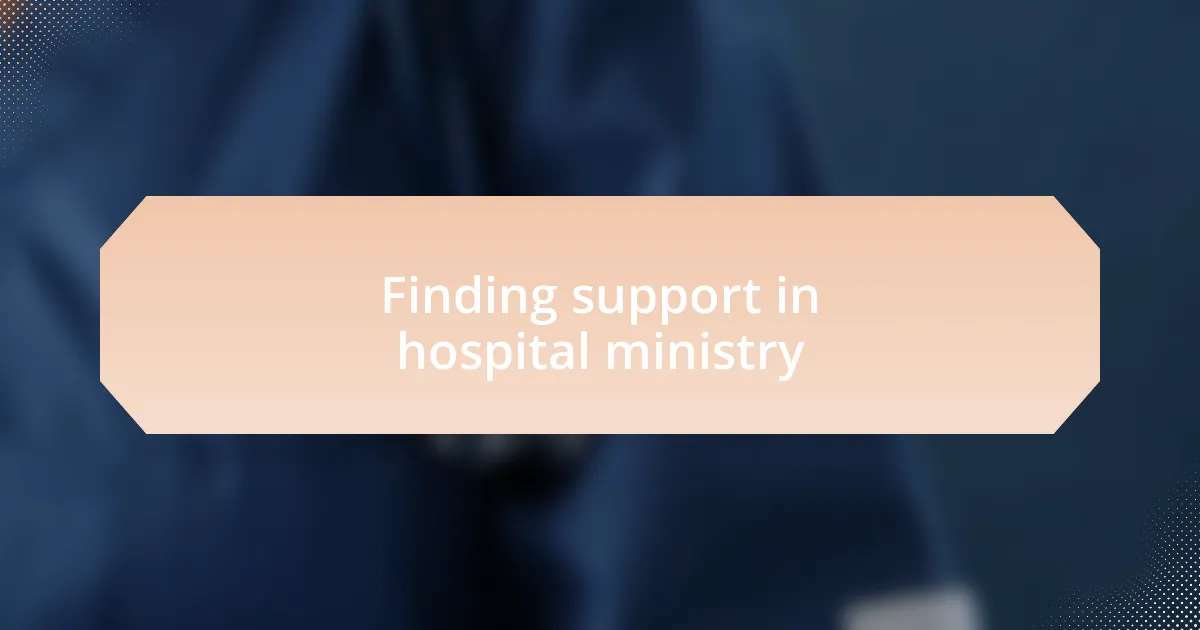
Finding support in hospital ministry
Finding solace in hospital ministry was a turning point for me. I remember attending a support group there, where others shared their experiences, tears mingling with laughter. In that circle, I felt a deep sense of belonging, realizing I wasn’t alone in my struggles. Have you ever found unexpected comfort in the stories of others?
Connecting with hospital chaplains revealed another layer of support I hadn’t anticipated. One particular chaplain listened not just to my words but to the emotions I was carrying—grief, confusion, and exhaustion. In that moment, I realized that having someone to process these feelings with was invaluable. Isn’t it amazing how the right support can lighten your emotional load?
Moreover, the ministry provided me with resources I never knew existed. I discovered workshops focused on self-care and spiritual growth, which opened my eyes to new perspectives. These experiences taught me that nurturing my own well-being is essential for being present for those I care for. How has seeking out these opportunities changed your approach to caregiving?
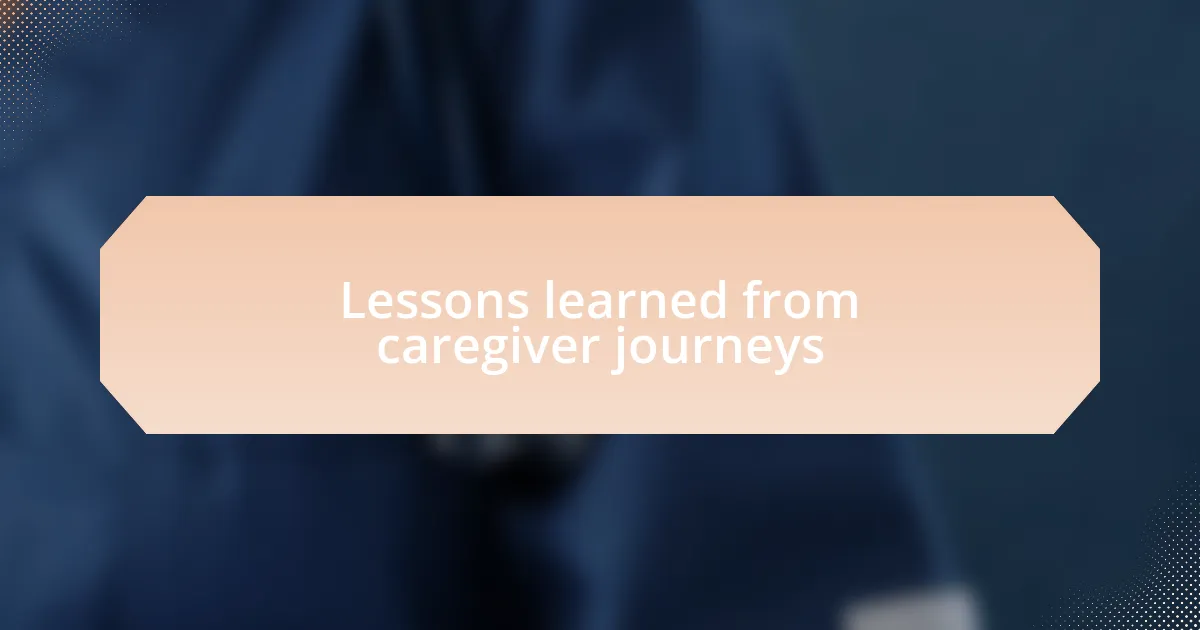
Lessons learned from caregiver journeys
Navigating the ups and downs of caregiving taught me that acknowledging my limits is crucial. I vividly recall a day when I pushed through fatigue, thinking that being strong meant doing it all. But that evening, I broke down, realizing that it was okay to ask for help. Have you ever felt that tension between strength and vulnerability?
I learned the importance of setting boundaries through painful experiences. There was a time when I overcommitted myself, thinking that more care meant better care. The toll it took on my mental health was staggering. It’s funny how we often equate caring deeply with sacrificing our own needs. Have you ever found that balance to be challenging too?
Reflecting on my journey, I recognize that self-compassion is not a luxury but a necessity. I remember one afternoon when I took a moment to breathe and simply sit in quiet reflection. This small act of kindness to myself turned out to be a game changer, helping me recharge in ways I’d never imagined. How do you nurture your own spirit amidst the demands of caregiving?